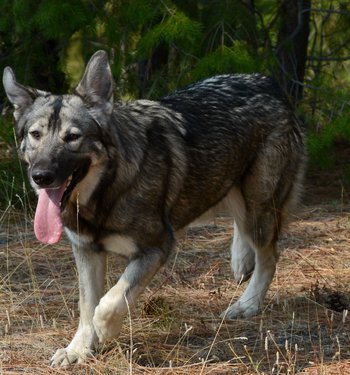The #1 health issue in DireWolf Dogs
By Jennifer Stoeckl, MAT - Dire Wolf Project CEO, March 12, 2024
Whelp… it happened again.
We have another reported case of hypothyroidism.
Regina (Tsar/Florin) has recently been diagnosed with hypothyroidism.
She is the first dog in 2024 to receive this diagnosis.
Last year, a whopping SEVEN dogs throughout the Dire Wolf Project (both American Alsatian and American Dirus lines) were reportedly diagnosed with the hormonal disease.
I will be conducting a lot more research on the pedigree over the next few months, but, I have a good idea what we’re dealing with already.
As you may know if you have been with us for a while, I have a highly structured plan to eradicate this relatively benign health issue from at least one line within the American Dirus side of the equation.
It will involve trial mating, which I will explain in more depth as we move forward with the plans we have lined up.
Regina is a particularly interesting case, however, because she had a litter of puppies for us, in which I kept a couple of females for breeding.
The first step in eradicating this disease from the breed is to do what NO OTHER dog breed that I know of does… and that is to inform all of you, whether you own our dogs or not.
Informed owners are powerful owners!
Just like Regina’s owners.
Because they were informed owners, they knew right away to do a T4 blood test and not mess around with all kinds of other tests and procedures to figure out what was going on.
Not only did the information save them thousands of dollars, but it saved Regina time. Because they knew the symptoms to look for, they tested their sweet silver girl and got her on replacement hormones right away.
With the inexpensive thyroid medication, Regina will live a normal life without any health complications whatsoever.
If your dog is related to Regina, be on the look out for the following symptoms:
- Weight Gain: Hypothyroidism can cause unexplained weight gain, even with a controlled diet.
- Lethargy: Dogs with hypothyroidism may appear sluggish, lethargic, and less active than usual.
- Exercise Intolerance: A dog with hypothyroidism may tire easily during physical activities or exercise.
- Cold Sensitivity: Dogs with hypothyroidism may be more sensitive to cold temperatures and seek warmth.
- Skin and Coat Changes:
- Dry, Flaky Skin: Hypothyroidism can cause dry, flaky skin.
- Hair Loss: Hair loss, especially on the trunk and tail, may occur.
- Dull, Coarse Coat: The coat may become dull, coarse, and lacking in luster.
- Slow Hair Regrowth: Hair may grow back slowly after shedding.
- Thickening of the Skin: Some dogs with hypothyroidism may develop thickened skin, especially in the facial area.
- Ear Infections: Increased susceptibility to ear infections can be a symptom.
- Changes in Behavior:
- Depression: Dogs may exhibit signs of depression or a change in demeanor.
- Mental Dullness: Cognitive function may be affected, leading to mental dullness.
- Gastrointestinal Issues: Hypothyroidism can contribute to constipation and other gastrointestinal problems.
- Muscle Weakness: Dogs may experience muscle weakness, leading to difficulties in movement.
- Slow Heart Rate (Bradycardia): Hypothyroidism can cause a decrease in heart rate.
- Infertility: Female dogs may experience irregular estrus cycles, and both males and females may face fertility issues.
If you observe any of these symptoms in your dog, it's crucial to consult with a veterinarian about a T4 blood test. Hypothyroidism in dogs is completely manageable with medication, and early detection and treatment can significantly improve your dog's quality of life.
Hypothyroidism onset in our breed generally happens anywhere from 1.5 to 4 years of age.
If your dog does develop this disease, please let us know right away. It is important for my breeding work going forward to know about as many positive cases as I can.
And remember… currently, we are looking at a 4.8% reported incidence rate.
That also means that 95.2% of our dogs have not reported hypothyroidism.
If you want to find out more about the science behind breeding a strongbred™ dog, read all about our work in the Dire Wolf Project book:
https://www.amazon.com/Dire-Wolf-Project-Creating-Extraordinary/dp/1950333019
Jennifer Stoeckl is the co-founder of the Dire Wolf Project, founder of the DireWolf Guardians American Dirus Dog Training Program, and owner/operator of DireWolf Dogs of Vallecito. She lives in the beautiful inland northwest among the Ponderosa pine forests with her pack of American Dirus dogs.